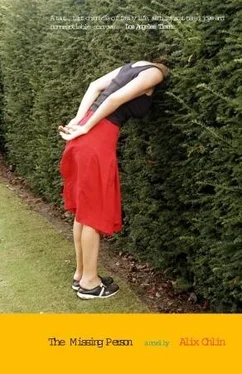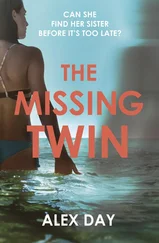“Okay,” I said. He kept walking, and a minute later I heard the same angry dogs raise another, accelerated alarm — this time, I was pretty sure, about him.
The sun and my hangover together woke me at seven. For a while I just lay there on my back, looking up at the white ceiling and wondering if everything I remembered from the night before was a dream. Did Wylie really come back? Did I really drink martinis with a man I hardly knew while an aging waitress sang karaoke songs she wrote herself? Did I really have sex in a motel room, more than once ?
“Oh, my God,” I said out loud. I could feel the night’s imprint on my body: the parched throat, the sensitive skin, a few memories in other places. Down the hall I could hear my mother moving around, the fizzle of the shower, and then some dish-clanging in the kitchen. I was surprised I usually slept through this racket.
I found her sitting at the table, tapping her spoon precisely at the dome of a soft-boiled egg.
“Good morning,” I said. She looked tired and wan, I thought, her skin even whiter than her office blouse.
She looked up, dropped her spoon, and made “I’m having a heart attack” motions over her chest. “Isn’t this a sign that the world’s coming to an end?” she said. “You getting up before noon?”
I poured myself a cup of coffee and watched her scoop out neat spoonfuls of egg and slip them gracefully into her mouth. I’d forgotten how much she liked these rituals — place settings and cloth napkins and square meals. An egg cup next to a slice of toast and a glass of juice: it was like a breakfast commercial.
“So, guess who I saw last night.”
“Someone who kept you out until quite late, that much I know.”
“It was only midnight.” I cleared my throat. “Wylie came by. Late last night or early this morning. I heard him in the driveway and went out to talk with him. He’s doing all right. He mostly seemed preoccupied with oil in the car. He really loves that Caprice.”
Relaying this news — even though Wylie came back on his own, and not due to my efforts — gave me a sense of accomplishment I hadn’t felt in quite some time. I sat back and waited for the inevitable kudos. Instead, she took her breakfast things into the kitchen and rinsed them in the sink.
“He’s been in Arizona,” I added, “but now he’s back.”
When she finally looked at me, her face was taut with anger, and her voice came out a whisper. “I cannot believe you let him just stop by and then prance right off. I cannot believe you didn’t wake me up, that you didn’t strap him down with rope. ”
“Mom,” I said.
“This is not a gas station.”
“I know.”
“It’s not a place where you check the oil and leave after five minutes.”
“I understood what you meant the first time.”
“I am very disappointed in you,” she said.
I sat there staring at my coffee cup. My throat hurt, my head hurt, the hair on my head hurt. I didn’t know what to say.
She took her purse and left, just like Wylie had.
Alone, I tried to find comfort in my usual routine — TV watching, ice-cream eating, et cetera — but couldn’t sit still. In Brooklyn I’d passed whole days without moving ten feet, but now I roamed around the far reaches of my mother’s condo for less than half an hour before deciding I had to leave. I put on my sunglasses and headed out into the day.
Angus’s hat was on the passenger side, neatly folded in half along its sweat-stained brim. I crammed the Sinatra tape inside it and threw them in the back, where I wouldn’t have to think about either one.
On the streets of Albuquerque, young guys in lowriders with family names calligraphed on the back windows were cruising around, bass lines pounding from their stereos, staring harshly at drivers whose cars bore different family names. Skateboarding kids were taunting children on foot. I noticed huge, disheveled crows hanging out on all the power lines and stray dogs meandering down the dirt alleys, skulking against walls and crossing streets heavy with traffic. At an outdoor coffeehouse a homeless man was busing people’s tables, whether they were done or not, then begging for change. Everybody I saw was suntanned and squinting.
My first stop was the university library. I wanted to look up the artist of my father’s paintings — as I’d come to think of them, even though I couldn’t remember him ever talking about them — and see whether there was any information about Eva Kent’s life and work. At the computer I went through the usual rituals — my father’s name, his book on the screen — before proceeding to my scholarly tasks. There was a reassuring familiarity to the stacks of torn scrap paper by the terminals, the useless stubby pencils, the Library of Congress classifications. I was in my element, or as close to an element as I had.
I rummaged through the sections on New Mexico artists of the later twentieth century, flipping through journals and small-press books and leaflets for any sign of her name.
Two hours of looking yielded exactly one item about Eva Kent, a 1978 magazine article about a show at the High Desert Gallery that contained none of her work. But scattered throughout the article were pictures taken at the opening-night reception: men in mutton-chop sideburns, women in dirndl skirts and turquoise squash-blossom necklaces. Everybody was smoking and looked drunk. One black-and-white photo showed two men laughing their heads off on either side of a lithograph; behind them, frowning slightly, was a woman. The caption read: “Ernesto Salceda, Bruce McGee, and Eva Kent.”
She had parted her long, black hair down the middle — a habit she must have adopted years earlier, because the part had widened to reveal a stripe of scalp. She had a substantial, commanding nose and a wide, tight-lipped mouth. She looked like someone who’d never spent a day lying on a couch eating ice cream in her entire life. Also, there was one other thing: she was unquestionably, enormously pregnant, but she didn’t carry herself like any pregnant woman I’d ever seen, at least anyone who was that far along. She didn’t have her hands clasped beneath her belly or resting above it, wasn’t sitting down or leaning back to compensate for the additional weight. Instead she was leaning forward, rather daintily, and frowning at the lithograph, ignoring the two men beside her, a cigarette burning in her right hand.
I sat for a while looking at the picture, turning possible events over in my mind. Eva Kent had a child, then painted the reverse pietà. As a portrait of motherhood, it was less than idealized, that picture of hers. From The Wilderness Kiss to The Ball and Chain wasn’t exactly a sentimental journey, and I couldn’t help wondering what had happened to her later. Since there were no other references to her after that opening in 1978, it occurred to me that maybe she’d stopped painting after having the child. I could do something with that, though it would be better, for what I had in mind, if something really bad had happened to her — a greater tragedy than the feminine mystique, that is. This was cynical, but no less true. Suzanne’s surrealist had died young of his brain tumor, whose side effects supposedly accounted for the more egregious imagery in his work.
I thought back to the night Michael and I wrote the abstract for my dissertation. The artists I was researching showed in alternative spaces and staged performance art, embracing the female body in all its sexuality and powers. They celebrated the vaginal imagery in O’Keeffe’s flowers and made a heroine out of Frida Kahlo. My project was supposed to reexamine this time period using the very modernist terms these women had worked so hard to defy. Michael thought it would make a big splash, but felt that I had to find the right kind of artists, and not performance artists, to elevate and promote.
Читать дальше












